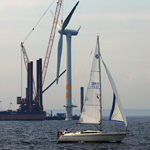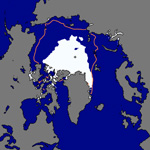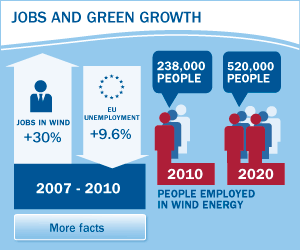 Earlier this month wind power in the UK produced a record amount of electricity – some 80 GW hours, or the equivalent to over 10% of the UK’s total electricity generation. While that record is something to be celebrated, it prompted several articles in the UK media claiming that backing-up wind by ramping fossil fuel plants up and down according to wind output, pumps out more carbon than running them at more consistent levels. But a blog published by the Guardian today highlights hard statistical evidence that puts paid to that claim.
Earlier this month wind power in the UK produced a record amount of electricity – some 80 GW hours, or the equivalent to over 10% of the UK’s total electricity generation. While that record is something to be celebrated, it prompted several articles in the UK media claiming that backing-up wind by ramping fossil fuel plants up and down according to wind output, pumps out more carbon than running them at more consistent levels. But a blog published by the Guardian today highlights hard statistical evidence that puts paid to that claim.
According to the Guardian, the ramping up and down carbon claim comes from the fact that a different type of gas power plant is required to produce gas-fired electricity in shorter time frames – open cycle gas turbines and not combined cycle gas turbines that are the most common producers of gas-fired electricity in the UK. Open cycle gas turbines are less efficient to run than combined cycle leading to the claim that backing up wind increases carbon emissions.
 Another international group has come out with a report highly critical of carbon dioxide (CO2) emissions, saying the rapid increase in greenhouse gas is threatening ocean-based food security because of acidification.
Another international group has come out with a report highly critical of carbon dioxide (CO2) emissions, saying the rapid increase in greenhouse gas is threatening ocean-based food security because of acidification.
The report by Oceana, an organisation focused solely on ocean conservation and protecting marine ecosystems, said Monday that the world needs to reduce CO2 emissions and end fossil fuel subsidies.
Its report, “Ocean-based Food Security Threatened in a High CO2 World,” noted that while fish and seafood are a primary source of protein for more than one billion of the poorest people on Earth, rising carbon dioxide emissions are causing the oceans to warm and become more acidic.

Mark Potter, RSA
By Mark Potter, Head of Renewable Energy at RSA
The number of countries with renewable energy targets more than doubled between 2005 and 2011. This is a clear sign that policymakers have seen the importance of promoting the benefits of clean energy, including the reduction of greenhouse gas emissions, job creation, the development of rural areas and greater independence and security of energy supply.
Last year, €12.6 billion was invested in wind farms in the EU. Nevertheless there seem to be some challenges ahead for this sector since the continuing European sovereign debt crisis is likely to negatively affect future growth, as some countries across Europe begin to see investment and subsidies for further development in renewable energy reduced.
 The French government will launch an offshore wind tender worth around 1GW by the end of the year, Prime Minister Jean-Marc Ayrault revealed at the weekend. He made the announcement during a government-hosted conference on the environment at which he and President Francois Hollande promised a plan to kick-start the renewables industry in France.
The French government will launch an offshore wind tender worth around 1GW by the end of the year, Prime Minister Jean-Marc Ayrault revealed at the weekend. He made the announcement during a government-hosted conference on the environment at which he and President Francois Hollande promised a plan to kick-start the renewables industry in France.
The previous government under the leadership of Nicholas Sarkozy awarded tenders to build offshore wind farms to produce 2 GW of energy in April, and this new tender is being seen as the second part of the initial offer. A full second round should be launched next year. The French wind energy association said the announcement was “good news”, but called for the government to “rapidly envisage a third tender for 3 GW” if the country were to meet its objectives of producing 6 GW from offshore wind turbines by 2020.

Artic sea ice on 18/09/2012, and previous extent in red.
A leading expert on ice suggests that the Arctic Ocean could be ice-free during the months of August and September as early as four years from now, a prediction that is rocketing formerly-held assumptions that advancing climate change wouldn’t melt the northern ocean’s summer ice for at least another two decades.
Cambridge University Professor Peter Wadhams said the rapidly increasing pace of summer ice melt is such a “global disaster” that humankind must urgently study other methods to thwart global temperature rise.
“Climate change is no longer something we can aim to do something about in a few decades’ time, and that we must not only urgently reduce CO2 emissions but must urgently examine other ways of slowing global warming,” he said in an email to The Guardian.
 Earlier this month wind power in the UK produced a record amount of electricity – some 80 GW hours, or the equivalent to over 10% of the UK’s total electricity generation. While that record is something to be celebrated, it prompted several articles in the UK media claiming that backing-up wind by ramping fossil fuel plants up and down according to wind output, pumps out more carbon than running them at more consistent levels. But a blog published by the Guardian today highlights hard statistical evidence that puts paid to that claim.
Earlier this month wind power in the UK produced a record amount of electricity – some 80 GW hours, or the equivalent to over 10% of the UK’s total electricity generation. While that record is something to be celebrated, it prompted several articles in the UK media claiming that backing-up wind by ramping fossil fuel plants up and down according to wind output, pumps out more carbon than running them at more consistent levels. But a blog published by the Guardian today highlights hard statistical evidence that puts paid to that claim.






 Comments
Comments



